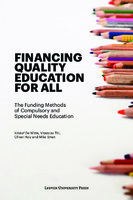Financing Quality Education for All
The Funding Methods of Compulsory and Special Needs Education
Author(s)
De Witte, Kristof
Titl, Vitezslav
Holz, Oliver
Smet, Mike
Language
EnglishAbstract
In OECD countries the average expenditure on primary and secondary education institutions is about 3.5% of GDP. The investment in education has large implications for economic development and the proper functioning of democratic institutions, as well as overall well-being. However, clear consensus and guidance on which system leads to the best educational outcomes is lacking. This volume describes the resource allocation for compulsory and special needs education for a selection of well-performing countries and regions on PISA tests. By studying the funding systems in well-performing countries and regions the authors identify the elements in the respective funding systems that are associated with best outcomes and have the ideal characteristics to pursue particular goals of education systems such as equity and efficiency. The funding methods of primary and secondary education as well as special needs education are covered.
Keywords
Resource allocation; Funding mechanisms; Primary education; Secondary Education; Special Needs Education; Equity; EfficiencyDOI
10.11116/9789461663009ISBN
9789462701915; 9789461663016OCN
1126145522Publisher
Leuven University PressPublisher website
https://lup.be/Publication date and place
Leuven, 2019Grantor
Imprint
Leuven University PressClassification
Educational strategies and policy
Educational strategies and policy: inclusion
Funding of education and student finance


 Download
Download Web Shop
Web Shop